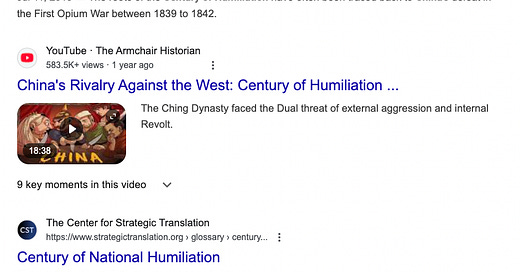The Qing Dynasty ruled China for almost 270 years, starting in the first half of the 17th century. By the middle of the 19th century, the dynasty was in trouble, pressured by internal conflict and foreign aggression. The Taiping Rebellion — led by an insurgent who was pretty sure he was closely related to Jesus Christ — demanded major reforms from a calcified regime, including land redistribution and an end to cultural practices like footbinding.
The Chinese regime eventually put down the rebellion, with tens of millions of deaths, but required considerable foreign assistance to prevail over the challenge to its power — which led to a further erosion of that power. The Opium Wars further opened China to foreign resource extraction, and the rulers of the country were unable to assert their authority over the growing threat. A strengthened navy was supposed to protect China from outside force, but in 1884 the French easily destroyed the most powerful Chinese fleet in a single attack. Historians discuss this period as China’s “century of humiliation.”
The Qing Dynasty attempted mild reform, through the auspices of the self-strengthening movement and the Tongzhi Restoration, but the power of the regime continued to erode.
In 1898, seeing that China was in steep decline, a group of Qing Dynasty officials proposed immediate and aggressive reform: The Hundred Days’ Reform, backed by an emperor who saw that his authority was evaporating and his country was fading. In a concentrated burst of effort, the emperor issued a long list of orders instituting significant change in Chinese institutions: “modernizing the traditional exam system, elimination of sinecures, creation of a modern education system (studying math and science instead of focusing mainly on Confucian texts, etc.), changing the government from absolute monarchy to constitutional monarchy with democracy, applying principles of capitalism to strengthen the economy, reorganizing the military, and industrializing all of China through manufacturing, commerce, and capitalism.”
As a leading reformer told the emperor, China’s institutions were rotten, and couldn’t be healed with mild doses of cultural medicine:
Our present trouble lies in our clinging to old institutions without knowing how to change… Nowadays the court has been undertaking some reforms, but the action of the emperor is obstructed by the ministers, and the recommendations of the able scholars are attacked by old-fashioned bureaucrats. If the charge is not “using barbarian ways to change China” then it is “upsetting the ancestral institutions.” Rumours and scandals are rampant, and people fight each other like fire and water. To reform in this way is as ineffective as attempting a forward march by walking backwards. It will inevitably result in failure. Your Majesty knows that under the present circumstances reforms are imperative and old institutions must be abolished.
The reformers failed. “The privileged classes of Chinese society were threatened by the attacks on corruption, the army, and the traditional educational system.” A remarkable figure within the dynasty, the Empress Dowager Cixi — a consort of an earlier emperor — exiled the emperor, seized power, ordered the arrest and execution of the reformers who weren’t able to escape the country, and ended the period of aggressive reform.
Historians have rehabilitated the Empress Dowager, or have tried to, arguing that she understood the need for reform and was just trying to move more cautiously. The meaning of her role in history is still debated:
But the bottom line is that she ended an aggressive effort at reform, and had reformers exiled and killed. However much she later pivoted to modernization, as the argument usually goes, she first repressed an attack on the institutional status quo.
The Empress Dowager crushed the Hundred Days’ Reforms in 1898. The Qing Dynasty collapsed in 1911, in a death that was formalized by the abdication of the final emperor in February of 1912.
Aggressive burst of reform blocked in 1898, death of the dynasty in 1911. The success of the Empress Dowager in blocking reform and preserving scelortic institutions was a step along the road to the rapid destruction of the entire governing order.





Surely, you're not suggesting that Trump's detractors - the unhinged kind crying "fascist" all the time - would understand what you alludes to in this post?
This is well beyond their cognitive facilities.
The Empress Dowager has no clothes. China has a much longer memory and history than we do. The CCP is getting revenge for the Opium War by flooding America with fentanyl and TikTok (digital opium): https://yuribezmenov.substack.com/p/ccp-opium-war-tiktok-fentanyl